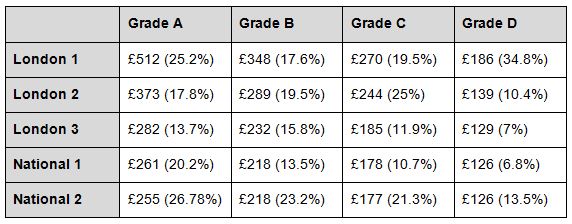In this week's bulletin we report on a recent housing case involving the scope of Rent Repayment Orders and the newly proposed guideline hourly rates for costs assessment in the courts. We have included links to other insights from across the firm and some positive news stories.
Guideline Hourly Rates 2021
Recommendations Published
The Civil Justice Council (CJC) has recommended an increase for the current Guideline Hourly Rates for Solicitors in England and Wales. Guideline Hourly Rates are a broad approximation used as a reference point when costs judges assess the costs of a party entitled to recover part or all of its costs from another party. The current guideline hourly rates have remained unchanged since 2010. The current rates claimed by Solicitors and fee earners are split into twenty categories, separated into National 2, National 1 and three London levels, and within these into Grades A, B, C and D, depending upon the seniority/experience of the individual.
An Interim Report was published in January 2021 which was followed by a consultation period that closed on 31 March 2021.
The final report, published on 30 July 2021, has made the following recommendations:
- an increase in the hourly rates allowable for litigants in person;
- reducing the London areas from 3 down to 2;
- implementing the Guideline Hourly Rate increases set out in the Interim Report;
- moving certain areas to different bands;
- the abolition of National Band 3;
The recommended hourly rates (with percentage increases) are set out below:

Given the subject matter, readers will not be surprised to hear that the 84 page (excluding appendices) report itself is reasonably dry. It is not clear whether paragraphs such as the following (with accompanying footnotes) are intended to sugar this pill, test whether the report is read, or maybe adumbrate the introduction of Ancient Greek into the Court Rules:
The working group is of the opinion that, while there may be those who might (with some justification) describe the task of revision of Guideline Hourly Rates as Herculean, it is hoped that pessimists who might go further and say it is Sisyphean will not prevail.3
3 “Then I witnessed the torture of Sisyphus, as he wrestled with a huge rock with both hands. Bracing himself and thrusting with hands and feet he pushed the boulder uphill to the top. But every time, as he was about to send it toppling over the crest, its sheer weight turned it back, and once again towards the plain the pitiless rock rolled down. So once more he had to wrestle with the thing and push it up, while the sweat poured from his limbs and the dust rose high above his head.” (Odyssey, Book 11:593)
Rent Repayment Orders and intermediate landlords
The Court of Appeal recently handed down judgement in the case of Rakusen v Jepson and others (2021) EWCA Civ1150. This was an appeal against the decision of the Upper Tribunal (Lands Chamber) which had held that a Rent Repayment Order (RRO) application could be made against any landlord of a relevant property.
The Appellant was the leasehold owner of a flat who granted a sub-tenancy to a property investment company. The terms of that tenancy permitted the company in turn to sub-let the whole or part of the flat. The property investment company sub-let parts of the flat under separate sub-tenancies and as this was therefore a house in multiple occupation (HMO), it should have obtained a licence from the local authority under Parts 2 and 3 of the Housing Act 2004, but failed to do so. A landlord that fails to obtain such a licence commits a criminal offence. Furthermore, a tenant may apply for an RRO (pursuant to Section 41 of the Housing and Planning Act 2016) against a landlord who has committed such an offence.
The sub-tenants therefore applied for an RRO against the Appellant. He in turn applied to strike out that application arguing that an RRO can only be made against the immediate landlord of the leases in question, which in this case was the property management company. The First Tier Tribunal refused to strike out the application but, when the matter reached the Court of Appeal, the Appellant was successful. The Court of Appeal held that the term 'landlord' was not defined in the Housing and Planning Act 2016 and that reference to a 'landlord' was usually a reference to the immediate landlord of the tenant. If the intention had been to extend liability to a superior landlord then Parliament would have said so.
Insights from the firm
- Podcast: Affordable housing secured funding – Trends, challenges and opportunities
- Acas publishes new advice on hybrid working
- Traffic light system: points to consider
- Tokyo Olympics: Team GB sailors Hannah Mills and Eilidh McIntyre win 470 gold
- Seasick swimmer makes history by completing Outer Hebrides challenge
- Climate change: Wales set to build 20,000 low-carbon social homes

